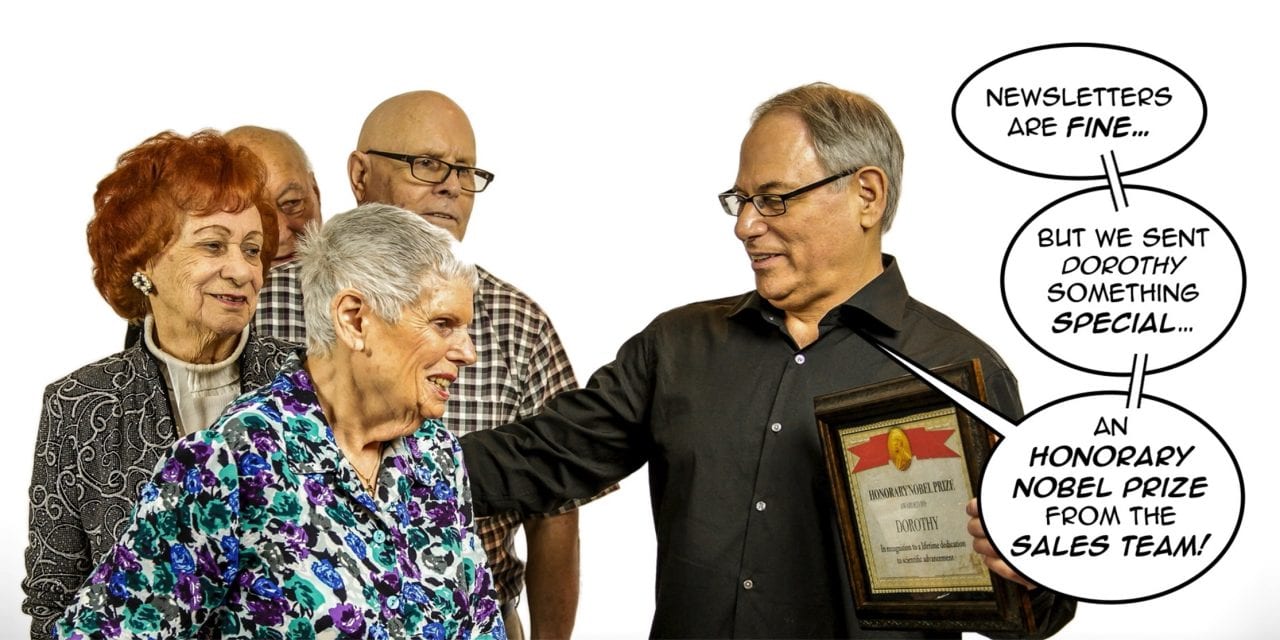The foundation of success in senior housing sales lies in establishing a real and emotional connection with your prospects.
By David A. Smith, CEO of Sherpa, a Senior Housing Forum Partner
The foundation of success in senior housing sales lies in establishing a real and emotional connection with your prospects. Creative, personalized, individualized, follow-up (what many of you refer to as CFU) is a way to demonstrate to prospects that you listened, that you cared, and that you took the time to think about them.
Executed properly, CFUs generate sales process advances and create additional opportunities for engagement. Executed poorly, they add additional tasks to an already stretched sales team. How can you or your team understand the difference? Let’s begin with a few definitions . . .
Creative: relating to or involving the imagination or original ideas. Stop and use this precious Time in the Selling Zone® to think about a way to convey to your prospect that you heard her and that you care. Sending a pie or flowers is a nice gesture, and great when you know very little about your prospect, but not very creative. The idea is for the prospect to know that you thought about THEM and spent some time doing something nice just for THEM.
Personalized: to design or produce (something) to meet someone’s individual requirements. What can we do for Mrs. Jones to really show her that we heard her story? Her needs? Her preferences? Again, an emphasis on personal preferences, not product-specific preferences.
Now that we have some definitions in mind, let’s explore pitfalls you may encounter as you add CFUs to your sales process.
Settling for a nice gesture
Many people who think that they are sending CFUs, in fact, are not. What they are actually doing is simply engaging in a “nice gesture.” For example, sending a personal note or an apple pie, if the prospect mentions they like apple pie, is a wonderful gesture. But it is not a personalized, creative follow up. It’s not specific to the prospect. When engaging in planning, ask yourself, does this gesture demonstrate to my prospect that I care about them and understand how difficult moving to a senior living community can be?
Not enough time
According to a study conducted using Sherpa Data by ProMatura Group in 2016 (see results here), best performers invest 10% of their total Time in the Selling Zone® on CFUs.
Why do CFUs work? Because instead of standardized sales tactics, these are individualized with surprising efforts. They shake up preconceived notions of your role of as a salesperson.
Where to start?
If something interesting or important comes up during a phone call or visit, take notes or ask for details. The more the CFU reflects the prospect’s unique values, the more impactful and evocative the follow up will be. Making connections based on personally significant factors is important at any stage of the sale process, but especially when those connections encourage additional face-to-face or voice-to-voice connections and inspire breakthroughs and changes in attitude.
For example, imagine that you learned from a prospect that she was a research scientist. You asked about her career, where she lived and took the time to explore her accomplishments and also her regrets. What did you do for a living? What was your passion? Your proudest accomplishment? Any regrets?
Maybe she mentioned how she had spent her life researching for a cure to viral infections. How her team got close, but “she never won the Nobel Prize.” Now, imagine creating a certificate for her, an “Honorary Nobel Prize,” acknowledging a lifetime of research. You framed it. Then you visit her at home and bring her the certificate. Talk about making an impact with this prospect!
It demonstrates to her that you were listening and you cared. And, perhaps even more than you initially realized, you do care, deeply, about her as a person and about what decision will be best for her. Because, perhaps, the greatest secret of all is that a CFU has less to do with the prospect, and more to do with the research and effort you as a sales professional expend in getting to know the person behind the transaction.
That is the basis for establishing stronger connections, and, ultimately, for helping more older adults make the right decision to move into your community.
For more information on Sherpa’s Prospect-Centered Selling® Program, please visit the Sherpa website by clicking on the button below:
Download a PDF copy of this article by clicking on the button below:










